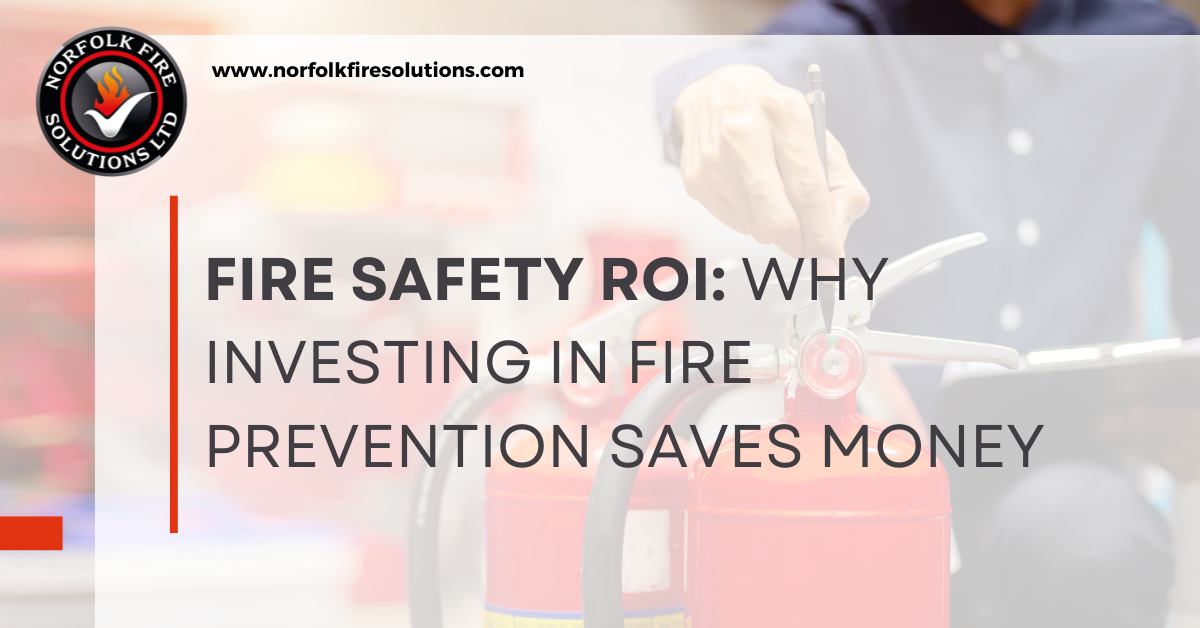Fire Safety ROI: Why Investing in Fire Prevention Saves Money
Fire Safety ROI: Why Investing in Fire Prevention Saves Money

Fire safety measures are often seen as an operational expense, but the reality is that they are one of the most cost-effective investments a business can make. Fires don’t just destroy property—they disrupt operations, damage reputations, and, in the worst cases, put lives at risk. Investing in fire safety now can save businesses from far greater costs in the future.
In this article, we’ll explore how fire safety measures deliver a significant return on investment (ROI) by preventing losses, reducing liabilities, and protecting business continuity.
The True Cost of Fire
Many businesses underestimate the wide-ranging impact of a fire. Here’s what’s at stake:
1. Property and Equipment Damage
- Direct damage to premises, machinery, stock, or office equipment can be devastating.
- Repairs and replacements can run into tens or even hundreds of thousands of pounds.
2. Business Interruption
- Closure during repairs means lost revenue and potentially losing clients to competitors.
- For example, after a fire, 25% of small businesses never reopen, highlighting how disruptive even a small blaze can be. Source: Cheshire Fire & Rescue Service
3. Legal and Regulatory Penalties
- Fines for non-compliance with the Regulatory Reform (Fire Safety) Order 2005 can be substantial.
- Businesses may also face lawsuits from employees or customers if negligence is proven.
4. Insurance Costs
- While insurance may cover some losses, payouts often don’t cover indirect costs like lost business or reputational damage.
- Post-fire, premiums may rise significantly.
5. Reputational Damage
- Customers and employees may lose confidence in a business after a fire, especially if negligence played a role.
How Fire Safety Saves Money
1. Preventing Property Damage
- Early fire detection and suppression systems, such as alarms and sprinklers, can stop a fire before it spreads.
- A fire extinguished early with a CO₂ extinguisher may save tens of thousands of pounds compared to a fire that destroys an entire office.
2. Avoiding Business Interruption
- A fire alarm system that detects smoke early allows for rapid evacuation and firefighting, minimising downtime.
- Emergency lighting ensures safe evacuation, preventing injuries and potential legal claims.
3. Reducing Insurance Premiums
- Many insurers offer lower premiums for businesses with robust fire safety measures in place, such as modern alarm systems or fire-resistant materials.
4. Ensuring Compliance
- By meeting fire safety regulations, businesses avoid fines, legal costs, and damage to their reputation.
5. Safeguarding Reputation
- Demonstrating a proactive approach to fire safety builds trust with customers and employees, reinforcing a positive brand image.
Calculating Fire Safety ROI
Scenario: A Small Retail Store
A small retail business invests in the following fire safety measures:
- Fire alarm system: £5,000 (installed).
- Fire extinguishers: £500 (5 extinguishers at £100 each).
- Emergency lighting: £2,000 (installed in key areas).
- Annual training and maintenance: £500.
Total Investment: £8,000 upfront + £500 annually.
Potential Costs Without These Measures:
- Damage to stock and property from a small fire: £50,000.
- 2 weeks of closure for repairs: £10,000 in lost revenue.
- Insurance premium increases over 3 years: £5,000.
- Reputational damage: £Unknown but significant.
By preventing even one small fire, the investment in fire safety has already paid for itself many times over.
Key Fire Safety Investments for Maximum ROI
- Fire Detection and Alarms:
- Early warning systems prevent fires from spreading and allow for quick evacuation.
- Fire Suppression Equipment:
- Properly maintained extinguishers and sprinkler systems are critical for controlling fires early.
- Staff Training:
- Well-trained employees know how to act quickly and correctly in a fire, potentially stopping a small incident from becoming a disaster.
- Emergency Lighting:
- Ensures safe evacuation, even during power outages, reducing the risk of injury claims.
- Regular Risk Assessments:
- Identifying hazards early and addressing them prevents fires from occurring in the first place.
Making the Business Case for Fire Safety
1. It’s a Legal Requirement
Compliance with fire safety regulations isn’t optional. Failing to invest in necessary measures can result in severe penalties.
2. It Protects Your Most Valuable Assets
Employees, customers, and property are the backbone of any business. Fire safety measures ensure their safety and preserve operational continuity.
3. It’s an Investment in Business Resilience
Proactive fire safety planning makes a business more resilient to risks, ensuring it can recover quickly if an incident occurs.
Conclusion
Fire safety isn’t just an expense, it’s an investment that protects lives, property, and livelihoods. Businesses prioritising fire safety enjoy peace of mind, financial savings, and a reputation for responsibility. By acting now, you can prevent costly mistakes later.
Don’t wait for an incident to highlight the gaps in your fire safety strategy. Start investing in prevention today, it’s the smartest business decision you’ll make.
